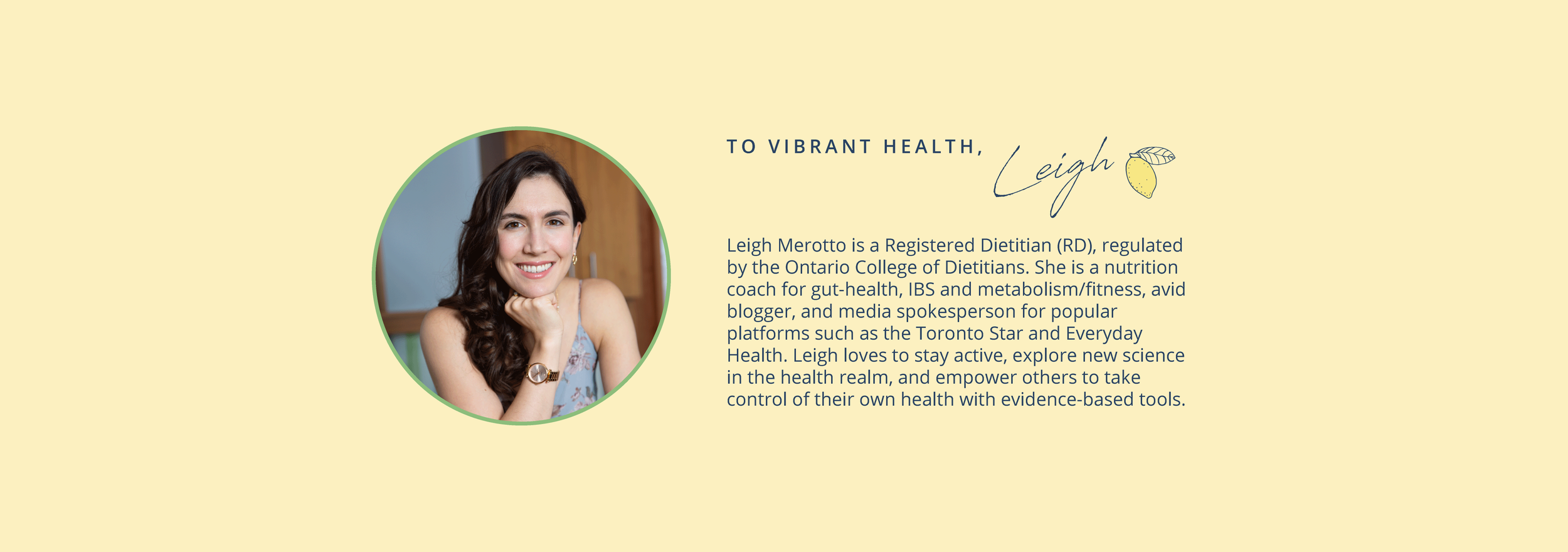10 Facts About IBS More People Need to Know (IBS Awareness Month)
The month of April marks Irritable Bowel Syndrome (IBS) Awareness Month in North America. Many of you living with IBS know the feeling of not being able to go out in skinny jeans, or missing dinners with your friends and family, or even not being able to travel out of fear of your symptoms.
While this is absolutely nothing to be ashamed of, I know that many people around you (friends, family, coworkers) do not exactly understand what you are going through.
In honor of IBS awareness month and being an IBS Dietitian, I wanted to share this post with some true facts on this condition to help support yourself and/or someone you care about living with IBS.
IBS is Considered a ‘Functional Gut Disorder’, But there is More to the Picture
IBS is considered a functional gut disorder - meaning that standard tests (scopes & bloodwork) will show up "normal", but there are some issues with how your intestinal tract contracts and the sensitivity of nerve endings.
BUT.... Researchers are learning more and more about what actually contributes to IBS development. We know recognize that common symptom drivers exist in those with IBS including:
Dysbiosis (imbalance in the gut microbiota - bacteria, yeasts, fungi);
Abnormal motility (aka how your gut moves food through)
Visceral hypersensitivity (abnormal sensation of pain in the nerve endings of the gut);
Low-grade inflammation
These are thought to contribute to the DEVELOPMENT and persistence of IBS symptoms.
So while there is technically no intestinal anatomy or abnormality in the biochemical (metabolic) process in IBS, there are common symptom drivers and thus ways that we can help heal, manage and potentially treat IBS.
2. IBS is a True Medical Condition, Not a “Diagnosis of Exclusions”
As alluded to above, IBS is a true medical condition. At present, it is defined as chronic, functional gut disorder characterized by abdominal pain or discomfort along with a range of other symptoms, including bloating, diarrhea, constipation, or alternating episodes of both.
No longer is it considered a diagnosis of exclusions. It is a true condition with an actual diagnostic process (more on that below!)
You may also want to read: IBS Explained: Symptom Drivers, Root Causes and How to Find Lasting Relief
3. IBS is Diagnosed Using the Rome IV Criteria
IBS has no specific medical test (blood test, x-ray, scope, etc.) quite yet (although scientists are working on it). It is usually diagnosed after other gastrointestinal conditions that may cause digestive symptoms are ruled out, such as Crohn's or colitis, celiac disease, etc. Then, the Rome IV Diagnostic Criteria for IBS is used to diagnose IBS and subtype by a medical doctor.
4. Know You Aren’t Alone
Sadly, IBS affects 1/7 North Americans, and only 40% of people actually seek professional help. The primary symptoms of IBS include abdominal pain, bloating, gas, diarrhea, and/or constipation. However, there are still SO many unseen symptoms that people struggle with everyday, including fear of food, travel, going out with friends, and so many more.
Many people are afraid to ask their family practitioner for help or mention it to others. Many people also normalize the symptoms, and it becomes a typical part of their everyday life. My message to you as an IBS Dietitian is not to hesitate to reach out for support and know you are not alone.
5. IBS is More Than Just “Needing to Use the Bathroom a Lot”
If you have IBS, you know that it is MUCH more than just digestive symptoms and needing the bathroom often. People living with IBS often experience many additional frustrations and symptoms including low energy, fatigue, stress (to find a washroom, the right foods, etc.), anxiety, depression, increased doctor's visits, body distrust, anxiety around food, and more.
Have you had this experience and can relate? Sadly, it’s more common than many people realize!
6. There Are Many “IBS Mimickers”
IBS symptoms can overlap with severe conditions, such as Celiacs, Colon Cancer, Pancreatitis, or Inflammatory Bowel Disease. It’s essential to seek care from your GP and Gastroenterologist for proper testing and diagnosis.
7. Dysbiosis is a Hallmark Cause of IBS
As mentioned above, an imbalance of the gut microbiota is involved in IBS. Data shows that people with IBS have an imbalance of ‘good’ and ‘bad’ microbes, and usually lower overal species diversity, in their gut microbiome including types of bacteria, as well as yeasts, which likely contributed to IBS development.
The dysbiosis could be due to past infections, stress, poor diet (low fibre, high in fat & processed foods), post-pregnancy, celiac disease, or other risk factors contributing to an imbalance in the gut microbiome.
You may also want to read: Gut Microbiome: What Is It and How Can We Better Support Our Gut Bugs?
8. Research Shows a Low FODMAP Diet Produces Symptom Relief in 3/4 People With IBS
As shown by research from Monash University, the low FODMAP diet has been shown to significantly reduce symptoms in 3 out of 4 people with IBS. While I don’t use the full low FODMAP diet for everyone with IBS in my practice, it can be very useful for my clients who experience visceral hypersensitivity, bloating and cramping while healing the gut and rebalancing the microbiome.
Curious about trying a low FODMAP protocol to identify trigger foods with IBS? You may also want to read: Considering a Low FODMAP Diet? Why Working With a Dietitian is Essential to Success
9. 40 to 60% of Those With IBS Experience Psychological Symptoms
Did you know that 40 to 60% of those with IBS experience psychological symptoms including anxiety disorders and depression? Are you included in this group? This fact gives us insight into the power of our gut-brain connection!
10. Over 90% of Serotonin is Produced in the Gut (Our Happy Hormone)
The gut is referred to as our “second brain”. Our gut is closely connected and constantly communicating with our brain (“gut-brain axis”). Our gut microbiota affect processes related to our nervous system including production of neurotransmitters, immunity, hunger/fullness hormones, and more.
Interestingly, over 90% of serotonin is produced in the gut (our happy hormone). A healthy gut flora supports a proper balance of this important mood neurotransmitter, which in turn may help us keep happier. Those with IBS may have dysbiosis and a disconnection between their gut and brain which can increase the risk for anxiety and depression.
Curious about the vagus nerve and IBS? You may also want to read: Vagus Nerve: Its Role in IBS and SIBO and How to Improve Function for Better Digestive Health
Bonus Fact: Managing IBS is More Than Just “Eating Healthier”
As a Registered Dietitian who has worked with 100s of clients with IBS, what I’ve come to realize over the years is that an INTEGRATIVE approach is key. I believe in sustainable lifestyle and diet shifts to help address the underlying symptom drivers including rebalancing the microbiome and lowering inflammation, in order to promote effective healing and support your gut functioning properly!
While I do specialize in low FODMAP for IBS and FODMAP intolerances are common, not everyone with IBS needs to start on an elimination diet (right away or early on in their journey). Doing low-FODMAP alone won’t give you full relief, and can actually sometimes make symptoms worse over time if not completed properly and with rebuilding the microbiome in mind.
Are you looking for a partner to help you manage IBS/IBS-like symptoms and find lasting relief? If you’re interested in gaining sustainable relief from IBS and gut symptoms with a regulated health professional through a personalized journey, I’d love to work together! Learn more about my Gut Harmony Method Program and apply here.
Closing Thoughts
Many people are afraid to ask their family practitioner for help, or mention it to others. Many people also normalize the symptoms, and it becomes a typical part of their everyday life.
But as an IBS & gut-health Dietitian, I want to change this. This has been my goal since starting a private practice focused on IBS & gut-health 5 years ago!
I want you to know that you are seen, your symptoms are valid, and you do NOT need to normalize this way of life. Because lasting freedom IS possible, and you DO deserve to live a full life without letting your IBS & gut symptoms hold you back. And I will always advocate for you.
Do you have a question about IBS or want to share your journey? Leave it below in the comments!










